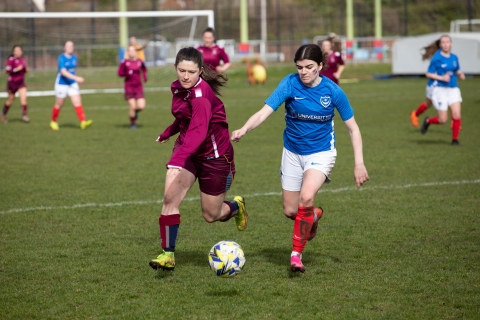

Can football be more inclusive? Dr Beth Clarkson’s research finds barriers to fair play.
13 July 2022
5 min read
Women’s football has been rising rapidly in popularity – and the Women’s Euro 2022 should further accelerate that trend. As the England team approach their final group game, it’s a good time to check in on a wealth of research by Dr Beth Clarkson. She reveals that, while there has been great growth in the women’s game, women professionals are too often kept on the sidelines of success.
Beth has worked as an elite youth football coach for over a decade. She delivers education programmes for the Premier League. And she is a women’s football policy advisor for FAIR Game UK, a group of football clubs striving for fair, sustainable change in the game.
Beth has seen firsthand ‘the power football can have in terms of developing people, and the social power it has to help inclusion.’ As Britain’s national sport, she feels football should be a mirror for our society. So, as a consultant on football leadership, strategy and governance, Beth turns her research into recommendations for change.
The competitiveness, viewership and marketability of women’s football is on an upward trajectory. Strategic investment attuned to the needs of the women’s game would be meaningful for the players and create value for fans, sponsors, investors, broadcasters and other stakeholders.
Dr Beth Clarkson, Senior Lecturer in Sport Management
Listening to diverse voices
Recently, Beth and colleagues submitted a paper exploring lived experiences of women football coaches from ethnically diverse backgrounds:
“There are stark inequalities that don’t make a career particularly appealing to some. Women have to be thick skinned and able to deal with acts that can be quite damaging and affect them personally in terms of their empowerment and confidence, and also in terms of their relationships with people they work with, officials and people in governance.”
Bringing people together is key to building solutions, so Beth is keen to work with people in policy, decision-making and operations within football. After all, many of the problems stem from a lack of interpersonal connection and diversity of voices:
“Take black or Asian female coaches, they often exist as the only coach who looks and sounds like them in their club or even their county. Speaking out then becomes very hard. Research is really important to help bring those voices together and amplify the collective issues that need addressing in a football culture that is becoming more inclusive, but still has a long way to go.”

The University of Portsmouth women's football team
Tackling misogyny and inequality
In 2022, Beth and Portsmouth colleague Christina Philippou led a hard-hitting report on the financial impact of gender inequality on football in England and Wales, commissioned by FAIR Game.
The team uncovered severe underrepresentation of women throughout the game, particularly in decision making roles – for example, two-thirds of all professional football clubs have all-male boards. They also found a lack of facilities and provisions for women has led to a massive loss in potential revenue at all levels. Women’s football has seen huge revenue, broadcasting and fan growth and could have great commercial possibilities.
The report makes practical recommendations: making matchdays and stadia inclusive environments, with child-friendly spaces; introducing ways for women to report incidents of sexism and misogyny and be taken seriously; consequences for perpetrators.
There are stark inequalities that don’t make a career particularly appealing to some. Women have to be thick skinned and able to deal with acts that can be quite damaging and affect them personally in terms of their empowerment and confidence, and also in terms of their relationships with people they work with, officials and people in governance.
Dr Beth Clarkson, Senior Lecturer in Sport Management
Boosting investment and growth
Recently, Beth contributed to an overview of women’s struggle for equal pay in sport. This noted a lack of basic pay has often left professional sportswomen slotting training in around better paid full-time or part-time work. The research team also identified a ‘be grateful’ narrative that leaves many women athletes reluctant to question inadequate workplace conditions. There have been great strides in international women’s football this year though – notably the USA women’s national team, who reached an equal pay agreement with the governing body after a lengthy legal dispute.
Big and small football nations are leading this change. But international football is only a small, yet symbolic, part of the problem and equal focus is needed on the domestic women’s game.
Accelerating the growth of women’s football requires investment in grassroots, academies, coaching and infrastructure to encourage participation and talent development from a young age. The resulting increased competitiveness would boost commercial value.
Beth says: “The competitiveness, viewership and marketability of women’s football is on an upward trajectory. Strategic investment attuned to the needs of the women’s game would be meaningful for the players and create value for fans, sponsors, investors, broadcasters and other stakeholders.”
The action-focused research of Beth and her peers could mark the start of a new era of true inclusivity, where foul play on and off the pitch always gets the red card. Hear more about Beth's research from Life Solved:
